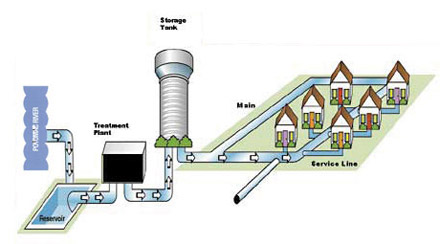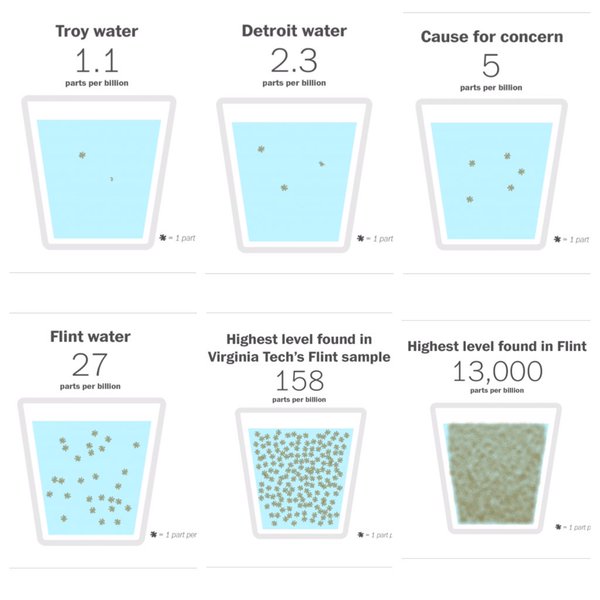From River to Tap: How Your Water is Cleaned and Delivered
With the Flint water crisis in the national spotlight and now Newark, many communities in New Jersey have a renewed focus on their water supply. When you turn on the water to take a shower, do you ever think about where your water comes from? The EPA estimates that we use between 80 and 100 gallons of water a day for residential demands, and more for other purposes. Millions of people have this quantity and quality of water available at the turn of a tap and most do not know how it gets to their homes.
Where does your water come from and who delivers it?

In New Jersey, treated drinking water comes from a variety of sources, depending on where you live. A Water Resources Baseline Assessment prepared for New Jersey Future by Daniel J. Van Abs of Rutgers University and published by Together North Jersey. It notes that according to the New Jersey Department of Environmental Protection (NJDEP), roughly 40 percent of our water comes from aquifers and 60 percent comes from surface waters. Aquifers are underground, water-bearing geologic formations, while surface waters are visible water sources such as rivers and reservoirs.
For the vast majority of New Jerseyans served by a public water system rather than a private well, a lot happens between the aquifer or surface water body and that shower. A water purveyor accesses the water and pumps it to a treatment plant. After treatment, the water is pumped through a network of large and small pipes. Eventually, the water arrives close to your home in an underground water main and then to your faucet through smaller service pipes, which you or your landlord owns.
Each community in New Jersey has a unique tale as to where its water comes from, how it is delivered, and who owns and operates the systems. Let’s take a look at how this system works in the Borough of East Newark. Tap water for residents in East Newark comes from the Wanaque Reservoir, which is filled by the Wanaque River and by pumps from the Pompton River and the Ramapo River. The North Jersey District Water Supply Commission pumps the water from the reservoir to its Wanaque Water Treatment Plant for cleaning. The treated water then comes to East Newark through a major pipeline. The water is delivered to residents through underground pipes owned by the borough and managed by its water department.
In New Jersey there are more than 600 community water systems, ranging widely in capacity. About 75 percent serve fewer than 10,000 customers. New Jersey is moderately unusual in that investor-owned utilities serve more than 40 percent of state residents and businesses, with publicly-owned utilities serving most of the rest. In some cases, public-private partnerships manage water systems, with the most common form combining public ownership with privately-contracted operations and maintenance. Residents who install a private well and provide their own drinking water represent another form of private water sourcing. About one-seventh of New Jerseyans obtain their water from private wells. But whether the infrastructure to bring the water to a residence is owned by a utility, municipality or private resident, the Water Supply Management Act has designated the water itself as a public asset of the state, held in trust for its citizens.
How do you know your water is safe?

As a result of the Flint water crisis, New Jersey residents and communities alike are taking a serious look into the safety of their drinking water. Community water systems use a host of treatment methods to provide drinking water that meets certain standards. However, no supply is entirely free of contaminants, including bottled water, so “safe” is a relative term. For water supply systems that serve the public, the NJDEP regulates water treatment and testing to ensure contaminant levels remain below federal and state Safe Drinking Water Act limits. To learn more about drinking water in your community, search the Drinking Water Watch database provided by the NJDEP. The database allows you to search by municipality and locate details on your community’s water source, water purveyor, infrastructure, water quality testing results and much more. You can also contact your water purveyor for a consumer confidence report, which is posted annually. Finally, some water utilities provide free testing of your home’s drinking water, or you can engage a private laboratory to test your water, which is recommended annually or at least biennially for water users who rely on private wells.
Investing to keep your water safe and affordable
Many of the pipes and facilities that pump, carry and treat your drinking water are aging, inadequate and inefficient, leading to water loss and potable water contamination. A recent report estimates that $7.9 billion is needed to fix New Jersey’s drinking-water infrastructure. Each municipality, utility and community has a responsibility to safeguard its drinking water system, but most are not equipped to invest the funds needed for upgrades. The costs of fixing these systems may lead to higher water rates for customers and residents, but the costs of not improving your community’s water system can be even higher.
Ensuring that residents throughout New Jersey receive high-quality drinking water is a serious issue facing the state. Inadequate, aging pipes, pumps and treatment facilities are stressed in trying to meet modern water demands, especially during periods with little rainfall. Learning about your water supply and water purveyor is a powerful way to get connected to and engaged with your water.
Jersey Water Works is a cross-sector collaborative of individuals and organizations focused on transforming New Jersey’s inadequate urban water infrastructure. Join the collaborative to get involved.